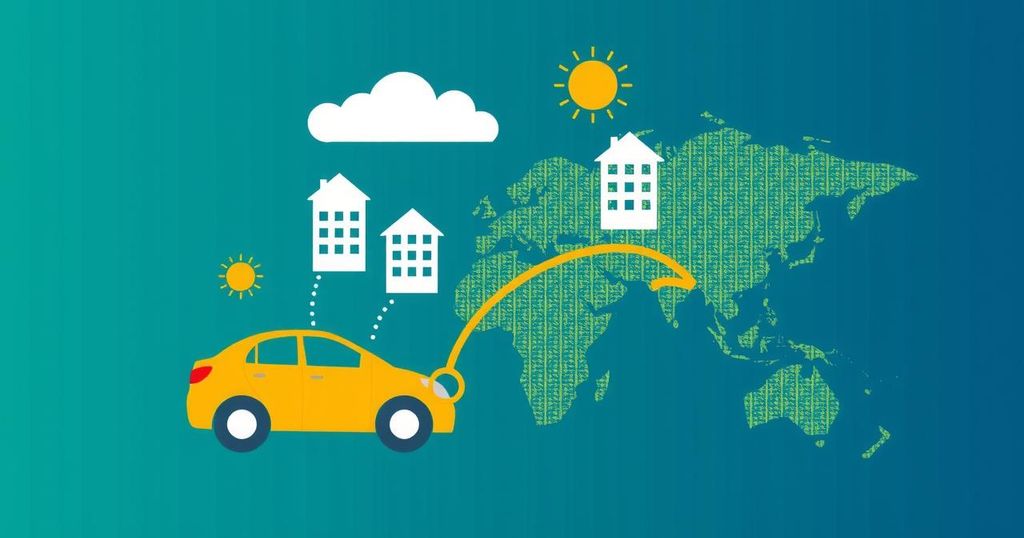Confronting Car Dependence: A Path to Economic Savings and Climate Resilience

A new study by the Union of Concerned Scientists reveals that reducing car dependence in the U.S. could save $6.2 trillion and significantly improve public health and climate outcomes. Proposed strategies include reducing vehicle miles traveled by 27% from 2035 to 2050, investing in walking, biking, and public transportation, to create equitable access for all.
A recent report by the Union of Concerned Scientists elucidates that reducing car dependence in the United States not only addresses climate change but also represents a potential economic boon of $6.2 trillion. This shift entails significant policy interventions aimed at decreasing the necessity for driving, thereby fostering healthier and more equitable communities while simultaneously advancing progress towards net-zero carbon emissions. The study, aptly named “Freedom to Move,” posits that diversifying transportation options is essential for an effective climate transition. The report indicates that by aiming to reduce vehicle miles traveled (VMT) by approximately 27 percent between 2035 and 2050, America could avert substantial costs. These include an estimated $201 billion in new energy infrastructure typically required to support the extensive electrification of vehicles. Furthermore, the prevention of roughly $128 billion in public health costs–stemming from emissions and pollutants associated with conventional vehicles, which burden particularly vulnerable communities–can be achieved. Shockingly, the analysis suggests that up to 250,000 fatalities in car crashes and 3.7 million injuries could be prevented with a significant reduction in VMT. Moreover, households across the nation would collectively save approximately $5.9 trillion in automotive-related expenses, including car payments and fuel, even while many households might continue to utilize their vehicles albeit less intensively. Kevin Shen, the report’s lead author, highlights that, “What we find is that reducing VMT and making sure to provide more transit options would be the most equitable way to make these kinds of changes, and would provide the most benefits to the people out there.” He further notes, “This doesn’t mean that everybody has to ditch their car. It could just mean that, instead of buying a second car per household, you shed a car. Or a certain percentage of your trips to the grocery store or to the doctor are met by an e-bike.” Despite expressing optimism regarding the feasibility of reducing car dependency, Shen acknowledges the challenge posed by the entrenched culture of car reliance that has developed over the past century. He details how automotive industries have historically influenced transportation policies and societal norms, stating, “The automotive lobby has [mounted] a very coordinated campaign for years… This campaign wound up making it so that streets were no longer for people in all sorts of different modes, but largely privileged fast-moving automobiles.” The study also emphasizes that the effort to electrify the existing car-heavy infrastructure would be both costly and inequitable, particularly for marginalized communities. Alarmingly, approximately 30 percent of Americans do not drive due to various constraints, and 60 percent face unsustainable housing and transportation costs, with communities of color disproportionately affected. Shen underscores the need for a paradigm shift in considering freedom in transportation choices, stating, “We titled our report ‘Freedom to Move’ for a reason… [We envision] a different kind of future: one where invoking the word ‘freedom’ doesn’t mean just ‘freedom to drive,’ but the freedom for everyone to have choices.” In conclusion, the findings of this report reflect a pressing need to reconsider transportation policies and practices in the U.S. By confronting car dependence on both ecological and economic fronts, it is conceivable to enhance quality of life, promote equitable access to resources, and significantly contribute to the battle against climate change.
The reliance on automobiles in the United States has long-standing implications for environmental sustainability, public health, and socioeconomic equity. As the country faces increasing pressure to mitigate climate change, it becomes essential to reevaluate transportation policies and their broader impacts. The Union of Concerned Scientists’ report provides valuable insights into the consequences of car dependency, illustrating significant economic benefits associated with reducing vehicle miles traveled and diversifying transportation options. By presenting evidence from research, the report emphasizes the potential for transformative changes that could benefit both individuals and communities at large.
The report from the Union of Concerned Scientists advocates a comprehensive transformation of American transportation policies with an emphasis on reducing car dependence. This approach not only offers substantial potential economic savings but also aligns with efforts to combat climate change and enhance public health. Embracing alternative transportation modes and reducing reliance on vehicles could yield multifaceted benefits for society while promoting more equitable resource allocation.
Original Source: usa.streetsblog.org




